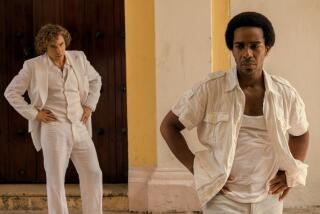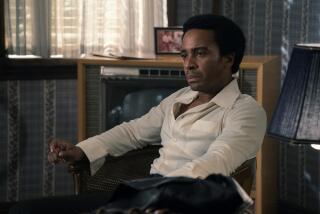Taking Huey Newton Off Posters and Onto the Stage : Theater: Roger Guenveur Smith’s show uses the ‘60s militant’s own words in an attempt to show the contradictions of the Black Panthers co-founder.
- Share via
Old radicals don’t die, they just get recycled as pop imagery.
In the 1970s, the bearded and bereted Che Guevara graced a poster that was de rigueur for campus lefties’ dorm rooms. More recently, the mark of Malcolm X turned up as the logo on a baseball cap.
Now, with the Melvin and Mario Van Peebles film “Panther,” at least two stage works and a number of books and articles on the Black Panthers due out this year, Huey P. Newton, who in 1966 co-founded the Black Panther Party for Self Defense with Bobby Seale, may well be next.
In fact, the controversial Newton, who was shot and killed by a drug pusher in Oakland in 1989, is no stranger to pop culture revisionism. Even when he was alive, he was known more as an icon than a full persona.
But writer-performer Roger Guenveur Smith--whose “A Huey P. Newton Story” opens at the Actors’ Gang Theatre today--isn’t content to let that legacy stand.
“Huey has traditionally been looked at as a poster--a guy with a black beret and black leather jacket on, sitting in a wicker chair with a spear and rifle in his hand,” says Smith, in a recent interview in a Silver Lake cafe. “But Huey Newton is a misunderstood person.”
While a key figure in the Black Panther movement, Newton was sequestered for much of the group’s heyday. “Because Huey was incarcerated or in exile for such a long period of time during the late ‘60s and throughout the ‘70s, people really did not know him,” Smith says.
Smith’s one-man performance is the Actors’ Gang’s first co-production in the Hollywood theater that it opened last year. The show, which features live sound design by Marc Anthony Thompson, was given a reading during the Mark Taper Forum’s New Works Festival last year and performed as a work-in-progress in San Francisco earlier this year.
*
Granted unprecedented access to Newton’s extensive personal archives (maintained by the Berkeley-based Dr. Huey P. Newton Foundation), Smith has carved a text entirely out of Newton’s own words.
“I thought that the best way of understanding Huey was to go to the source,” says the Los Angeles-reared and Yale School of Drama-trained Smith, who is familiar not only from his stage works, but also from several Spike Lee films.
The Newton family, which administers the foundation, had seen and liked Smith’s previous solo, “Frederick Douglass Now,” which was also based on historical material. So, after a year of what Smith describes as “trust building,” they agreed to let the artist have a look at Newton’s papers and records.
As his rapport with the family grew, Smith was also given a glimpse of other aspects of the late militant’s life. “It was eerie in a sense, because I was allowed to sit basically where Huey would have sat, were he still alive,” says the actor, who also plays an FBI agent in the upcoming Van Peebles film.
“I was privy to conversations that Huey would have been privy to, in the house or going out at lunch with people.”
And the deja vu didn’t stop there. “It’s also eerie in that I bear a certain resemblance to Huey Newton, which has been almost startling to the family,” Smith continues. “The whole process has been unnerving in that way.”
Unnerving perhaps, but also illuminating. “This material confirmed what I had suspected about Huey Newton all along, which was that he was an exceedingly compelling figure who was full of contradictions,” Smith says. “He could be the leader of a profoundly disciplined movement and at the same time addicted to alcohol and drugs.”
Those internal contradictions--as well as the distance between the public’s expectations of Newton and the man himself--were, in part, what led to Newton’s isolation.
“When Huey was released from prison and went on a speaking tour across the country in 1970, he disappointed a lot of people,” Smith says. “He was the symbol of resistance for a movement which boasted particularly dynamic speakers.”
However, “he did not consider himself to be a great public speaker and he was not,” Smith continues. “He had a high, shrill voice which got even higher and more shrill the more excited he got.”
Not surprisingly, this caused the already volatile Newton a great deal of stress. “There was a certain paranoia which came from the rush of being thrown out of the solitary life in prison into the adulation of the crowd,” Smith says. “Later, he did become reclusive, trapped in a solitary confinement of his own design.”
Newton ended up living in an Oakland penthouse apartment across from the Alameda County Jail and Courthouse, where he had served time for killing an Oakland police officer. From this perch, he spent hours gazing, via a telescope with an attached camera, down into the very jail cell in which he’d been held.
Smith uses some of the photographs that Newton shot--of the jail, a bleak Lake Merritt waterfront, an overcast sky--as a key scenic element in the show, so that “the audience is able to see the world literally as (Newton) saw it.”
Still, the portrait of Newton that emerges in “A Huey P. Newton Story” is not meant to pin down one indisputable version of the Panther Party co-founder’s life.
Rather, Smith explores Newton’s contradicting images. “There have been two camps,” he says. “One sees only the heroic Huey who headed this internationally influential organization. The other sees Huey the gangster, alleged murderer and rapist. That’s the violent Huey, the man who misrepresented himself and the real goals of his party.”
But neither side has the whole picture. “The truth that Huey struggled to define for himself is outside of both of them,” says Smith. “That’s the truth I’m trying to get at.”
* “A Huey P. Newton Story,” Actors’ Gang Theatre, 6209 Santa Monica Blvd., Hollywood. Today-Feb . 12. Thursdays-Sundays, 8 p.m. $15. (213) 466-1767.
More to Read
The biggest entertainment stories
Get our big stories about Hollywood, film, television, music, arts, culture and more right in your inbox as soon as they publish.
You may occasionally receive promotional content from the Los Angeles Times.










